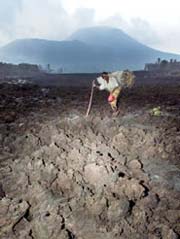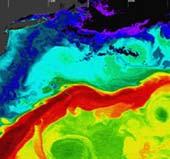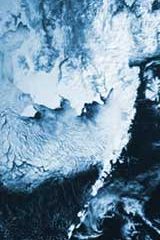Earth Sciences (also referred to as Geosciences), which deals with basic issues surrounding our planet, plays a vital role in the area of energy and raw materials supply.
Earth Sciences comprises subjects such as geology, geography, geological informatics, paleontology, mineralogy, petrography, crystallography, geophysics, geodesy, glaciology, cartography, photogrammetry, meteorology and seismology, early-warning systems, earthquake research and polar research.

Results from a 20-year study reveal dramatic ecological changes to lakes in Antarctica caused by a 1°C temperature increase. The findings, reported this week in SCIENCE, are yet more evidence of extreme changes in the Antarctic Peninsula region. This area has experienced some of the most rapid warming of anywhere on Earth in the past 50 years (2.5°C). The study lakes, on Signy Island, lie some 700 km north-east of the Antarctic Peninsula.
Scientists from the Cambridge-based British Antarctic Surv

Scientists received several day’s warning of abnormal seismic activity.
Two seismological stations on Mount Nyiragongo in eastern Congo gave several days’ advance warning of the volcano’s possible eruption, scientists working in the area say.
But the lack of a functioning government in the war-torn region may have prevented the evacuation of the nearby city of Goma, where 45 were confirmed dead and an existing humanitarian crisis was worsened by the eruption.

One of the really big challenges in anthropology is to date accurately the arrival of humans in the different continents. New results, to be published in a forthcoming issue of the Journal of Quaternary Science, show that humans arrived in Australia a lot earlier than was previously thought.
It is generally argued that humans evolved in Africa and then spread out over the other continents progressively through time, arriving in the most distant, such as Australasia, relatively recently. The

One of the more controversial environmental issues, which emerged in the final years of the Soviet era, was the plan to dam and reverse the flow of north-flowing rivers in order to irrigate the dry southern steppes. This scheme was roundly criticised by scientists and environmentalists at the time because of fears for the impact on the Arctic Ocean and global climate. It now appears that nature performed this experiment some 90,000 years ago.
This months issue of the Journal of Quaternary

Argon traces keep tabs on climate change.
A new method for detecting tiny quantities of a rare form of the element argon may help oceanographers to trace the vast undersea currents that regulate our planet’s climate.
The technique can pick out one atom of the rare isotope argon-39 (39Ar) amid 10 million billion other atoms. That’s equivalent to detecting less than a litre of water in America’s 300-mile Lake Michigan.
Philippe Collon, a nuclear physicist at the Lamon

Natural randomness punctuated past ice ages with warm spells.
Natural randomness in the world’s climate system may have caused the frequent, fast and fleeting returns to warm conditions during past ice ages, say two German scientists 1 .
Andrey Ganopolski and Stefan Rahmstorf at the Potsdam Institute for Climate Impact Research think that the flickering character of ice-age climate is a signature of stochastic resonance. This is the counter-intuitive phenome